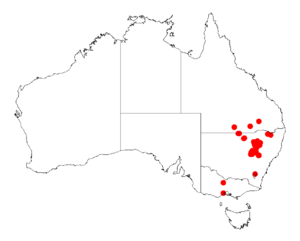Pillaga wattle facts for kids
The Pillaga wattle (Acacia pilligaensis) is a type of tree or shrub that grows in eastern Australia. It's also sometimes called pinbush wattle. This plant belongs to a large group of plants called Acacia, which are well-known for their beautiful flowers.
Quick facts for kids Pillaga wattle |
|
|---|---|
| Scientific classification |
|
| Kingdom: | Plantae |
| Clade: | Tracheophytes |
| Clade: | Angiosperms |
| Clade: | Eudicots |
| Clade: | Rosids |
| Order: | Fabales |
| Family: | Fabaceae |
| Clade: | Mimosoideae |
| Genus: | Acacia |
| Species: |
A. pilligaensis
|
| Binomial name | |
| Acacia pilligaensis |
|
 |
|
| Where Pillaga wattle grows in Australia | |
| Script error: The function "autoWithCaption" does not exist. | |
Script error: No such module "Check for conflicting parameters".
Contents
About the Pillaga Wattle
The Pillaga wattle usually grows to be about 2 to 5 meters (6.5 to 16 feet) tall. It can stand up straight or spread out. Its bark is grey and has small cracks. The branches are often smooth and might feel a bit sticky because of a natural resin.
Like most Acacia plants, the Pillaga wattle doesn't have regular leaves. Instead, it has special flattened leaf stalks called phyllodes. These phyllodes look and act like leaves. They are flat and can be straight or slightly curved. They are usually about 1.5 to 4 centimeters (0.6 to 1.6 inches) long and very thin, about 0.5 to 1 millimeter wide. Most of the time, they are smooth, but sometimes they can have a few hairs near the bottom.
Flowers and Seed Pods
The Pillaga wattle blooms between August and October. Its flowers grow in small, round clusters called flower-heads. These flower-heads are bright yellow and are about 4 to 7 millimeters (0.16 to 0.28 inches) across. Each one has about 20 to 30 tiny flowers. They grow from the spots where the phyllodes meet the stem.
After the flowers, the plant forms flat, paper-like seed pods. These pods are mostly straight and smooth, except where the seeds are. They are about 4 to 7 centimeters (1.6 to 2.8 inches) long and 3 to 4 millimeters (0.12 to 0.16 inches) wide. The pods can also be a bit sticky. Inside, the seeds are dark brown, oblong (like a stretched oval), and about 3.5 to 4 millimeters (0.14 to 0.16 inches) long.
How it Got its Name
The Pillaga wattle was first officially described in 1920 by a botanist named Joseph Maiden. He wrote about it in a scientific paper. For a short time in 2003, another botanist, Leslie Pedley, reclassified it. But in 2006, it was moved back into the Acacia group.
The plant's scientific name, pilligaensis, comes from the Pilliga scrub area in Australia. This is where the first plant sample, called the type specimen, was collected. Sometimes, people confuse the Pillaga wattle with another similar plant called Burbidge's wattle.
Where the Pillaga Wattle Lives
The Pillaga wattle is a plant that is endemic to Australia. This means it only grows naturally in certain parts of Australia. You can find it in separate areas (a disjunct distribution) in north-eastern New South Wales and southern Queensland.
It often grows in sandy soils in places like the Pilliga scrubland, around Gulgong, and in the Goonoo State Forest. It's usually found in dry sclerophyll forests, which are forests with plants that have hard, tough leaves.
 | May Edward Chinn |
 | Rebecca Cole |
 | Alexa Canady |
 | Dorothy Lavinia Brown |

